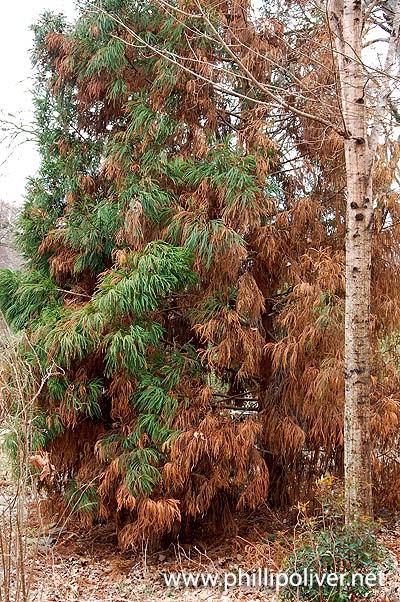Hydrangea wilt updated

Last September, I posted an entry about a situation with our hydrangeas where entire stems were dying mysteriously. I thought I had identified the problem as mushroom root rot after reading the Alabama Extension Agency's fact sheet on hydrangea diseases. Well, it turns out, I was wrong! I am a blogger (and librarian for heaven's sake), not a professional botanist, but it pains me to disseminate false information. I'm here to correct the situation!
Earlier in the week, our local Master Gardener's association held their monthly meeting and featured a wonderful speaker, Lisa Barnett, from the American Hydrangea Society. She had the same problem with her hydrangeas and a colleague sent a sample to an expert at the University of Georgia who identified the culprit as a borer - the Black Twig borer, Xylosandrus compactus (a cousin of Ambrosia beetle, Xylosandrus
crassiusculus). Lisa thinks the droughts of previous years contributed to the problem and weakened the shrubs, making them vulnerable to attack.
If you suspect this in your garden, look at the hydrangea stems closely. You will see a tiny hole along the stem where the insect has entered the plant and sawdust-like substance on the ground. To help eradicate the problem, cut the affected canes completely to the ground and burn them. Do not throw them on your compost pile! If a shrub seems to be completely infected, destroy the entire plant. The borer also attacks other shrubs and trees with similar sized branches.
Let's hope this cold winter will kill off some of these nasty buggers!
I plan to monitor our hydrangeas carefully this year and I urge you to do the same.

Comments
Hydrangeas bring such great color & texture to a garden.
P.S. You have an interesting blog - I am new to blogging and realize I have much to learn... :)
http://www.rdrop.com/~paul/hulse.html
this is the site that i found that explained how to do the rose cuttings - like i said it's the wrong time of the year - the rose has no leaves, but i still hope some of them make it. Good Luck!
BTW, your hydrangeas look great
Aanee
Irish Florist